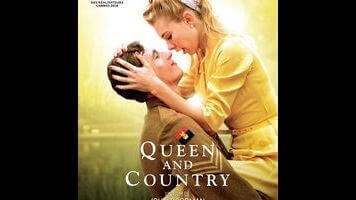John Boorman’s Queen & Country doesn’t work as a sequel to his Hope And Glory

John Boorman’s marvelous Hope And Glory (1987) created a portrait of World War II that had never been seen on film before (and hasn’t since): a giddy child’s-eye view from the London home front, in which houses bombed to smithereens serve as rubble-strewn playgrounds for the youngest survivors. Nominated for five Oscars, including Best Picture, the film was heavily autobiographical, but it also seemed wholly self-contained. It’s not likely that anyone who enjoyed it at the time wondered about a possible sequel.
Nonetheless, here one belatedly is. Queen & Country picks up Boorman’s alter ego, Bill Rohan (now played by Callum Turner), nine years after the end of WWII, when he’s old enough to be conscripted for two years of military service in the midst of the Korean War. Something of a wiseacre, Bill quickly befriends a troublemaker named Percy (Caleb Landry Jones), and the two of them while away their days teaching new recruits how to type and plotting revenge against their sadistic, by-the-book superior, Sgt. Major Bradley (David Thewlis). Bill also falls in love with a beautiful young woman (Tamsin Egerton) who’s so troubled and mysterious that she won’t even tell him her name—he dubs her Ophelia. Most of the film occurs within the confines of boot camp, but Boorman occasionally has Bill take his new friends to visit his family at his home on a small island in the Thames, where the final stretch of Hope And Glory took place. (It’s now revealed that Shepperton Studios is nearby, prodding Bill/Boorman into filmmaking.)
As a sequel, Queen & Country doesn’t work at all, primarily because Boorman waited far too long. Much of Hope And Glory’s cast is either dead (Ian Bannen) or semi-retired (Sammi Davis, Sarah Miles); they’re all the wrong age, in any case, since nine years have elapsed in the narrative versus 27 years in the real world. (The film premiered at Cannes last May, in the Directors’ Fortnight.) Boorman compounds this difficulty by recasting every part except one: David Hayman reprises his role as Bill’s father, Clive, wearing a terrible wig that’s clearly meant to disguise his advanced age. Even without that distraction, though, no credible continuity exists between the two films. Vanessa Kirby does solid work as Dawn, Bill’s free-spirited older sister, but her performance has almost nothing in common with Sammi Davis’ in Hope And Glory—they seem like two completely different people, not just physically but temperamentally. Anyone coming to Queen & Country with the expectation of seeing old friends will be gravely disappointed.
On the other hand, if you’ve never seen Hope And Glory, or can just put it out of your mind, the new film makes for a perfectly enjoyable service comedy, playing like a defanged British version of M*A*S*H that never actually gets to Korea. Turner looks a bit like Adam Driver, and has a similar penchant for putting an unpredictable spin on his lines; he’s nicely matched with up-and-comer Jones (X-Men: First Class, the forthcoming Heaven Knows What), who’s even more of a live wire. The film is at its best when it ignores Bill’s family and girlfriend—the Ophelia subplot goes nowhere, and while that may well reflect what really happened to Boorman, it’s unsatisfying dramatically—in order to focus on the monotony of military life. One seemingly minor prank involving a stolen clock gradually mushrooms into a major incident, landing one character in prison and another in a mental hospital. There’s no glory here, and precious little hope, either.